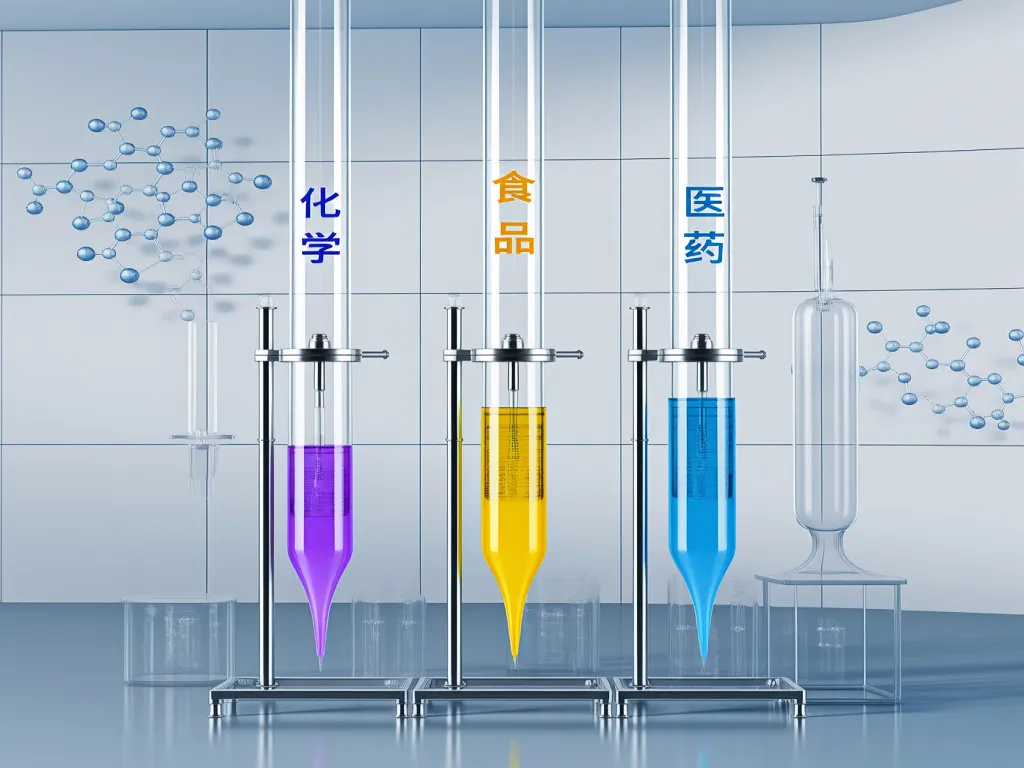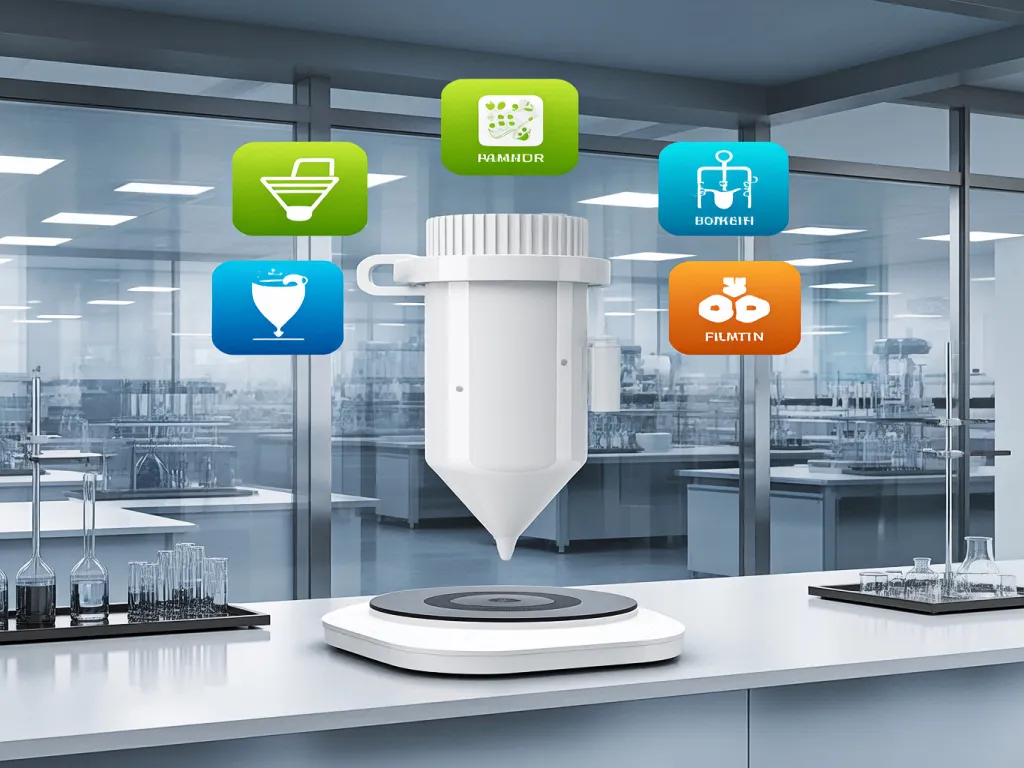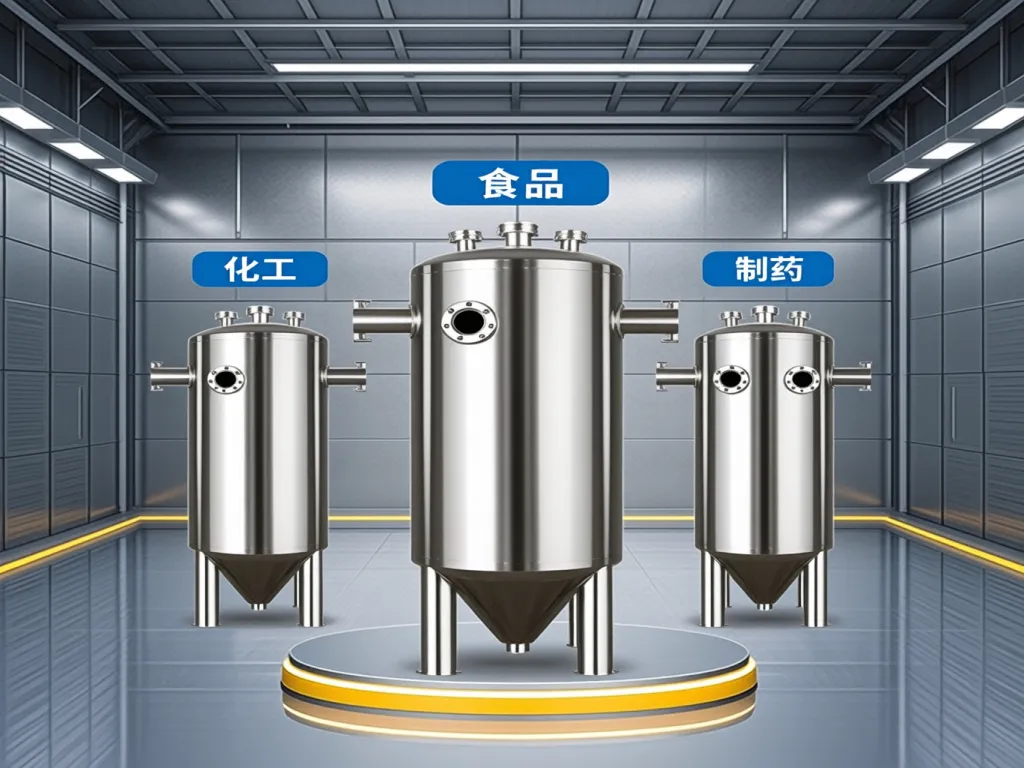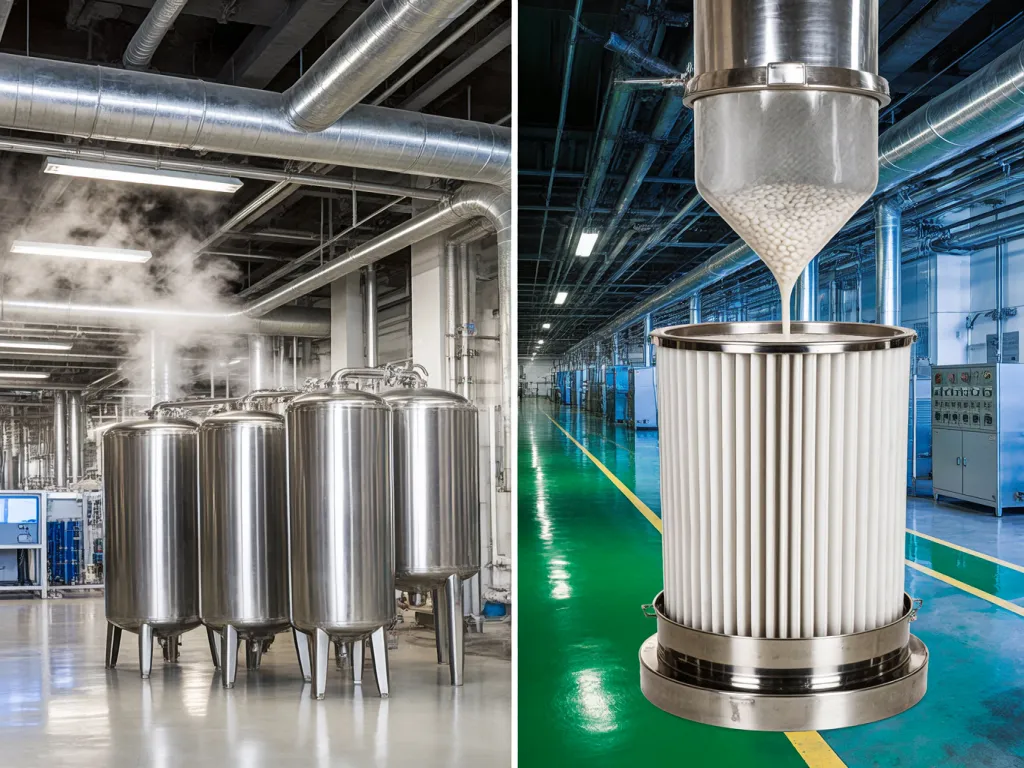Industry-Specific Guide: Choose Your Ideal Bag Filter Housing
When it comes to industrial filtration, not all scenarios are created equal. Whether you’re in the chemical, food, or pharmaceutical sector, the demand for precise filtration varies significantly. Enter the bag filter housing – a versatile solution tailored to meet your industry’s unique needs. But how do you ensure you’re picking the right one? This blog dives deep into the nuances of selecting the ideal bag filter housing, setting the stage for enhanced efficiency and cost savings. Ever wondered if a one-size-fits-all approach works in industrial filtration? Let’s find out together.

Industry-Specific Filtration Needs: A Deep Dive into Chemical, Food, and Pharmaceutical Sectors
When it comes to selecting the right bag filter housing for your industrial application, understanding the unique filtration demands of each sector is crucial. After all, what works seamlessly in one industry might falter in another. So, let’s roll up our sleeves and dive into the nitty-gritty of how different industries—chemical, food, and pharmaceutical—shape their filtration requirements, focusing on filtration accuracy, media properties, and more.
First up, the chemical industry. Here, the stakes are high, and the challenges are complex. Chemicals often come with a side of corrosiveness, toxicity, and high viscosity. That means your bag filter housing needs to be tough, resistant, and capable of handling not just solids but also liquids and gases. Filtration accuracy in this sector is paramount; even a tiny particle can trigger a chemical reaction, leading to contamination or, worse, a safety hazard. So, you’re looking at precision filtration, often down to the micron level, to ensure only the cleanest, safest product moves forward.
Now, let’s switch gears to the food industry. Here, the focus shifts dramatically. While filtration accuracy is still key, the emphasis is on preserving the quality, taste, and safety of the food. Imagine filtering juice or milk; you need a bag filter housing that can remove impurities without altering the flavor or nutritional value. Media properties matter a lot here. The filter material must be food-grade, non-toxic, and often, disposable to prevent cross-contamination. Plus, the filtration process needs to be gentle enough not to damage delicate food particles.
Last but not least, the pharmaceutical industry. This is where precision meets purity on a whole new level. Pharmaceuticals demand sterile conditions, and any contamination can have severe health implications. So, the bag filter housing here must be designed for ultra-high filtration accuracy, often requiring HEPA (High-Efficiency Particulate Air) filters or even more advanced technologies. The media properties are equally critical; they must be inert, meaning they won’t react with the pharmaceuticals, and they must be capable of capturing even the smallest particles, including viruses and bacteria.
So, how do you choose the right bag filter housing for your industry? It starts with understanding these specific needs. Ask yourself: What’s the nature of the media I’m filtering? How precise does my filtration need to be? Are there any regulatory standards I must adhere to? By answering these questions, you’re laying the groundwork for a selection that’s not just good but perfect for your industrial scenario.
Remember, there’s no one-size-fits-all in industrial filtration. Each sector has its own set of rules, and your bag filter housing must play by them. Whether it’s the ruggedness needed in chemicals, the gentleness in food, or the sterility in pharmaceuticals, the right choice can make all the difference in efficiency, safety, and cost-effectiveness. So, take the time to assess, to understand, and to choose wisely. Your industrial process deserves nothing less.

Chemical Industry: Corrosion, Toxicity, and Viscosity
In the chemical realm, the bag filter housing must be a fortress against corrosion and toxicity. Chemicals can be harsh, eating away at materials that aren’t up to the task. Viscosity adds another layer of complexity; thick, gooey substances demand a filter that can handle the flow without clogging. Filtration accuracy here is about preventing unwanted reactions and ensuring product purity. It’s a delicate balance, but one that’s essential for safety and quality. For further insights into chemical filtration challenges, consider exploring this academic study: chemical filtration research.
Food Industry: Quality, Taste, and Safety
For the food sector, the bag filter housing is a guardian of quality and taste. It must remove impurities without leaving a trace, preserving the natural flavors and nutrients. The media properties are all about being food-safe and non-reactive. And let’s not forget about hygiene; the filter must be easy to clean or replace to prevent any bacterial growth. It’s a tall order, but one that ensures the food we eat is as delicious and safe as it should be.
Pharmaceutical Industry: Sterility and Precision
In pharmaceuticals, the bag filter housing is a shield against contamination. Sterility is non-negotiable, and the filtration must be precise to the extreme. The media properties here are about being inert and capturing even the tiniest of particles. It’s a field where every micron counts, and the right filter can mean the difference between a safe medication and a health risk. The stakes are high, but so are the rewards when you get it right.

Material, Structure, and Design: Tailoring Bag Filter Housing to Your Industry
When it comes to bag filter housing, one size definitely doesn’t fit all. Different industries have unique demands that influence not just the type of filter housing you need, but also its material, structure, and design. Let’s dive into how these elements can be customized to suit various industrial scenarios. First, materials matter—a lot. In the chemical industry, for instance, you’re dealing with corrosive substances and high temperatures. Stainless steel or specialized alloys might be your go-to here because they resist corrosion and can handle extreme conditions. On the flip side, the food and beverage sector prioritizes hygiene and non-reactivity. Food-grade stainless steel or even certain plastics could be ideal, ensuring no contaminants leach into the product. For a deeper dive into selecting the right material for your specific application, consider consulting resources like filter bag material selection guides. Next up, structure. The design of your bag filter housing must align with the flow rate and pressure requirements of your operation. High-volume manufacturing plants might need a larger, more robust housing with multiple filter bags to maintain efficiency. Smaller operations or those with variable flow rates could benefit from a modular design, allowing easy scaling up or down. And let’s not forget about ease of maintenance. Quick-open closures or swing-bolt designs can significantly reduce downtime during filter changes. Design intricacies also play a pivotal role. For pharmaceutical applications, where purity is paramount, a design that minimizes dead space and prevents cross-contamination is crucial. This might mean a housing with smooth internal surfaces and minimal welds. In contrast, a mining operation might prioritize durability and ease of cleaning over these finer points, given the abrasive nature of the materials being filtered. But why stop at off-the-shelf solutions? Customization is where the real magic happens. Imagine a scenario where your process involves a mix of high-temperature gases and particulate matter. A standard housing might not cut it. Instead, you’d need a custom-built unit with insulation to handle the heat, combined with a self-cleaning mechanism to keep particulates in check. This level of customization ensures optimal performance and longevity, saving you from frequent replacements and downtime. Let’s talk about a real-world example. A dairy processing plant was struggling with butterfat clogging their filters, leading to frequent shutdowns. By switching to a custom-designed bag filter housing with a larger surface area and a specialized pre-filter stage, they reduced clogs by 80% and doubled their filter life. The result? A significant boost in productivity and a happier bottom line. Customization isn’t just about solving immediate problems; it’s about future-proofing your operations. As industries evolve and regulations tighten, having a bag filter housing that can adapt—whether through material upgrades, structural modifications, or design tweaks—ensures you stay ahead of the curve. So, when you’re in the market for a bag filter housing, don’t just settle for what’s on the shelf. Think about your specific needs, the challenges you face, and how a tailored solution could make all the difference. After all, in the world of industrial filtration, precision and adaptability are the names of the game.
Material Selection: The Foundation of Customization
The choice of material for your bag filter housing is the first step in customization. Each industry comes with its own set of environmental challenges. For the chemical sector, materials that withstand corrosion and high temperatures are essential. Stainless steel variants, like 316L, offer excellent resistance to a wide range of chemicals. In food processing, materials must be non-toxic and easy to sanitize. Here, plastics like polypropylene or food-grade stainless steel shine. The key is to match the material properties with the operational environment to ensure longevity and safety.
Structural Considerations: Size and Accessibility
The structure of the bag filter housing must accommodate the volume and pressure of the materials being filtered. Large-scale operations may require a housing with multiple filter bags and a high flow rate capacity. Conversely, smaller setups or those with fluctuating demands benefit from a modular design. This flexibility allows for easy adjustments as production needs change. Additionally, accessibility features like hinged covers or quick-release mechanisms simplify maintenance, reducing operational interruptions.
Design Details: Precision and Purity
Design intricacies are where customization truly shines. Industries like pharmaceuticals demand a housing design that minimizes contamination risks. This involves smooth internal surfaces, minimal welds, and materials that don’t shed particles. For heavy-duty applications like mining, the focus shifts to durability and ease of cleaning. The design should facilitate quick removal of accumulated particulates, ensuring consistent performance. By tailoring these design elements, you can address the unique challenges of your industry.

Case Studies: Successful Applications of Bag Filter Housing in Industrial Scenarios
When it comes to industrial filtration, the ‘one-size-fits-all’ approach simply doesn’t work. Every industry has its unique set of challenges, and bag filter housing must be tailored to meet these specific needs. Let’s dive into some real-world examples where customized bag filter housing solutions have made a significant impact, boosting efficiency and cutting costs. First up, let’s talk about the chemical industry. Picture a bustling chemical plant where the air is thick with various particulates and corrosive gases. Here, the standard bag filter housing just won’t cut it. The solution? A customized housing made from high-grade stainless steel, designed to withstand the harsh chemical environment. This not only extended the lifespan of the filter but also reduced maintenance costs by a staggering 40%. How did we achieve this? By working closely with the plant engineers, we identified the exact chemical exposure levels and designed a housing that could resist corrosion while maintaining optimal filtration efficiency. Moving on to the food and beverage sector, hygiene is paramount. A dairy processing plant faced issues with bacterial contamination in their filtration system. The culprit? A standard bag filter housing that wasn’t easy to clean and sanitize. Our solution was a fully welded, crevice-free housing with smooth internal surfaces, making it a breeze to clean and reducing the risk of bacterial growth. The result? A 30% drop in contamination incidents and a significant boost in product quality. The food and beverage industry is just one example where specialized filtration solutions are critical—learn more about food and beverage filtration applications. But it’s not just about materials; the design plays a crucial role too. Take, for instance, a pharmaceutical company struggling with fine particulate filtration. Their existing setup was inefficient, leading to product loss and increased downtime. We stepped in with a bag filter housing featuring a unique pleated bag design, maximizing the filtration area within the same footprint. This not only improved filtration efficiency by 25% but also reduced the frequency of bag replacements, saving them thousands in operational costs annually. For more insights on how filtration systems are tailored for the pharmaceutical industry, explore filtration in the pharmaceutical industry. Now, you might be wondering, ‘How do I know if my industry needs a customized solution?’ Well, it starts with understanding your specific filtration needs. Are you dealing with corrosive substances, high temperatures, or fine particulates? Each of these factors influences the choice of materials, design, and even the type of bags used. But don’t worry, you don’t have to figure this out alone. Partnering with a reputable bag filter housing manufacturer who understands your industry’s nuances can make all the difference. They can conduct a thorough site audit, analyze your filtration requirements, and recommend a solution that’s not just effective but also cost-efficient in the long run. And the benefits don’t stop at improved filtration. Customized bag filter housing solutions can lead to reduced energy consumption, as a well-designed system requires less power to operate. They can also minimize waste generation, as efficient filtration means fewer rejects and rework. Plus, with fewer breakdowns and maintenance needs, your plant can enjoy higher uptime and productivity. So, if you’re still using a generic bag filter housing, it’s time to rethink. The industrial landscape is evolving, and so should your filtration solutions. By investing in a customized bag filter housing, you’re not just buying a product; you’re investing in the long-term efficiency and profitability of your operations. Ready to make the switch? Let’s talk about how we can tailor a solution that fits your industry like a glove.
Chemical Industry Case Study
In the chemical industry, the environment is often harsh, with corrosive substances and high temperatures. A customized bag filter housing made from high-grade stainless steel can withstand these conditions, extending the filter’s lifespan and reducing maintenance costs. By collaborating with plant engineers, we designed a housing that resists corrosion while maintaining optimal filtration efficiency, resulting in a 40% reduction in maintenance expenses.
Food and Beverage Sector Success
Hygiene is critical in the food and beverage industry. A dairy processing plant faced bacterial contamination issues due to a standard bag filter housing that was difficult to clean. Our solution was a fully welded, crevice-free housing with smooth internal surfaces, making it easy to sanitize. This reduced contamination incidents by 30% and improved product quality significantly.
Pharmaceutical Industry Breakthrough
A pharmaceutical company struggled with fine particulate filtration, leading to product loss and increased downtime. We introduced a bag filter housing with a unique pleated bag design, maximizing the filtration area. This improved efficiency by 25% and reduced bag replacement frequency, saving thousands in operational costs annually.
Selecting the right bag filter housing is pivotal in elevating your industrial filtration game. By understanding your industry’s specific demands and customizing your solution, you unlock a world of efficiency and economic benefits. From the chemical lab to the food processing line, each sector has its own story to tell with tailored bag filter housing applications. Now that you’re armed with the knowledge to make an informed choice, why wait? Dive into customizing your filtration setup and watch your operations soar. And remember, the journey to optimal filtration doesn’t end here – there’s always more to explore and refine. Share your success stories or questions below, and let’s keep the conversation going!
